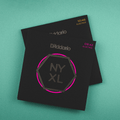What are the best acoustic guitar strings for beginners?
By Strings Direct – 29 August, 2023

When you walk into your local music shop or scour our website searching for your first set of acoustic guitar strings, you’re met with a multitude of choice. As somebody who is new to the guitar, a huge number of options can feel quite overwhelming; we can sympathise as we’ve all been there and asked the same questions:
“What on Earth is a gauge?”
“What do all these funny numbers mean?”
“Should I just choose a set that’s called ‘Medium’”
“Are the ones with colourful packaging better than the others?”... ARGH!!!! My head hurts!!!”
All these things can sound a bit scary and make you want to go for a lie down in a dark room. But fear not, there’s nothing to be scared of! In this guide to the best acoustic strings for beginners, we’ll aim to cut through the noise and help guide you on your journey towards choosing your next set of acoustic guitar strings. No paracetamol required!
I NEED STRINGS FOR AN ACOUSTIC GUITAR, RIGHT?
It’s important to ensure that you buy a set of strings that’s been specially designed for acoustic guitars. Our website has a category dedicated to Acoustic Guitar Strings and most sets will have the words splashed across the front of their packaging so if you keep your eye out for these things, you're heading in the right direction.
This may seem an obvious point to start off with, however, as you continue your guitar playing journey you’ll begin to notice the distinct differences between sets for different guitar types. For example, a set of electric guitar strings won’t sound great if they’re strung on an acoustic guitar and vice-versa! With this in mind, it’s always advisable to buy a set of strings that’s been designed for the task at hand.
WHICH BRAND SHOULD I CHOOSE?

This may be one of the first questions you ask yourself. After all, there are just so many to choose from. In theory, you can choose a set of acoustic strings from any brand. However, when starting out our advice is to choose a set from one of the popular name brands such as D’Addario, Ernie Ball, Rotosound or Martin. If you stick to a set of strings from these guys you’ll be getting a well-made, well-priced product that will suit most steel strung acoustic guitars.
Here at Strings Direct, we also have our own brand of acoustic guitar strings called Legacy. These are made for us right here in the UK. We’ve designed a quality set that represents great value for money, so these would be an ideal choice for any acoustic player who’s just starting out! No bias of course ;-)
ACOUSTIC GUITAR STRING GAUGE
For beginners, if there’s one aspect of your acoustic guitar strings that we’d suggest paying attention to, it’s definitely your choice of gauge as this will have the biggest influence on how the strings feel and how easy they will be to play.
But you may be asking the question:
"What exactly is string gauge?"
Well, here’s a little crash course:
String gauge refers to how thick the strings are. Each string has a numerical value that represents how thick it is and this is measured in thousandths of an inch.
For example, a popular high-E (or 1st String) on an acoustic guitar is .011” (Eleven thousandths of an inch). As an abbreviation, players will often refer to this simply as a ‘11’ gauge string. So an .012” gauge string (twelve thousandths of an inch) will be shortened to ‘12’ and so on... . The larger the number, the thicker the string will be.
When it comes to acoustic guitar strings sets, you’ll often see the gauges written like this; 10-47, 11-52, 12-53, etc... . These numbers represent the gauge range within that particular set. For example, if we were to take an extra light 10-47 gauge set, the smaller number (10) denotes the gauge of the thinnest string in the set and the bigger number (47) represents the gauge of the thickest string. Therefore, we can see that a set of 11-52 or 12-53 gauge strings is thicker (aka heavier) than a set of 10-47 gauge strings.
You may have heard people say “I use 10’s” or “I use 11’s.” In this instance, what they are referring to is a set of strings where the first string (or thinnest string) in the set is a 10 gauge or 11 gauge and so on.

WHICH STRINGS GAUGE IS BEST FOR A BEGINNER?
Here at Strings Direct we always say that a lighter gauge set is best for beginners. Our recommendation for a good gauge for beginners would be 10-47 or 11-52. Of course, if you feel these are too heavy, there are a handful of brands who also produce sets beginning with a 9. We’ve also listed some of our favourite options at the end of this blog for you.
“So why do you suggest choosing a thinner set of strings? I’ve heard that thicker strings sound better than thinner ones!”
There’s a word in the guitar world that you’ll hear mentioned a lot. That word is “Tone”. Every guitarist is striving for a “better tone” (or better sound) and many players argue that heavier strings equate to a “better tone”. Whilst true in theory, it's a fiercely debated topic, so we always recommend beginners starting their acoustic guitar journeys using lighter gauges.
One of the main reasons is that thinner strings require less effort to press them down. It’s inevitable that when you first start out, you’ll suffer from sore fingertips. It’s something we all have to go through and given enough practice you’ll start to build up strength in your hands and the skin will start to harden around your fingertips. Until this happens, a lighter gauge set of strings will certainly help ease any soreness in these early stages. Not only that, guitar playing may mean that you’re using muscles in your hands and arms that you've rarely used before, so a thinner set will also help to prevent muscle soreness or repetitive strain injury.
Furthermore, lighter gauge strings allow you to concentrate on improving your technique. If you’re struggling to press the strings down, this could eventually lead to bad playing habits. Trust us when we say that when you’re learning, improving your technique will contribute a hell of a lot more to your tone than a heavier set of strings ever will.
IT'S ALL ABOUT THOSE NUMBERS
Before we wrap up talking about gauges, there’s another small piece of advice we’d like to offer. As you start to explore different sets of acoustic guitar strings, you’ll see that as well as using numbers to denote string gauges, many manufacturers also use terms such as ‘extra light’, ‘light’ and ‘medium’ etc. Whilst these names are meant to help describe the gauge, they can in fact cause more confusion. The reason is that not all manufacturers use the same names as each other. For example, one brand may refer to their 12-53 set as ‘Light’, another as ‘Medium Light’ and somebody else could call their set 'Medium'… it can all be very confusing!

The fact of the matter is both sets are listed as 12-53 gauge, they’ll be the exact same thickness as each other, regardless of the name they have been assigned by the manufacturer. So remember, it’s all about the numbers! For more information on this topic, you can read our blog post.
**TIP** Another little tip for you: whenever you change your strings, be sure to keep the outer packaging of your new set in your guitar case. That way, when it comes to buying your next set, you’ll know exactly which set you last had on your guitar.
WRAP MATERIALS OF ACOUSTIC GUITAR STRINGS
One of the other facets of strings you may need to choose from is the type of wrap material your strings are constructed from. The majority of acoustic guitar strings you see will be made from one of two variations of bronze; ‘Phosphor Bronze’ and ‘80/20 Bronze’ with most manufacturers offering both types of string.

In a nutshell, phosphor bronze acoustic strings give a warm, well-balanced tone whereas 80/20 bronze strings have a distinctly brighter and more ‘zingy’ tone. Neither type of bronze is “better” than the other, they simply offer a slightly different sound to one another.
If you are given the option, simply go with what sounds more appealing to you... there’s no harm in choosing either type of bronze as both are great options.
SILK & STEEL STRINGS SETS
Whilst we’re discussing string material, it’s worth mentioning another type of acoustic string that is a great option for beginners and these are known as "Silk and Steel" strings. These strings have a silk filament running underneath the outer winding which gives the strings a mellower tone (see image below). More importantly (for beginners) these strings have less tension in them meaning they’ll feel softer under the fingers and be easier to play. If these sound appealing, we’ve suggested some sets at the bottom of this post for you.

Of course, if you’re interested in exploring all the other alloys used for acoustic guitar strings, be sure to check out our blog post titled ‘The Great Acoustic Alloy Experiment’
COATED AND NON-COATED ACOUSTIC STRINGS
Before we leave you to begin your search for your strings there’s one final piece of (non-essential) advice we’d like to offer and that is to start by choosing uncoated strings.
In recent times, string manufacturers have started to apply microscopically thin polymer coatings to the outer surface of their strings. The coating acts as a barrier against sweat and other atmospheric unpleasantness attacking and degrading the surface of the string, it’s tone and lifespan. As a result, coated strings last a lot longer than standard uncoated guitar strings.
Whilst we love coated strings here at Strings Direct, their longer life means you’re presented with fewer opportunities to practice changing your strings. This isn’t absolutely essential, but just a thought as we believe that learning to change your strings is an important skill in becoming a well-rounded guitar player.
If you need some advice on how to change your acoustic guitar strings, be sure to check out our video on how to do this:
CONCLUSION
We really hope you have found this blog post useful. We understand that all this information can be perplexing so if you still feel a little uncertain on what strings to buy, we’ve compiled a short list of suggested sets that will be a perfect choice for beginners. Choose any of these sets below and you’re sure to be on solid ground:
'9' GAUGE ACOUSTIC STRINGS SETS
(The thinnest gauge acoustic guitar strings available)
• Rotosound JK Phosphor Bronze 09-48
•D’Addario EZ890 09-45
'10' GAUGE ACOUSTIC STRINGS SETS
(A great option young and new players)
• Legacy Phosphor Bronze 10-50
• D’Addario EJ15 Phosphor Bronze 10-47
• Martin MA170 80/20 Bronze 10-47
•Rotosound JK Phosphor Bronze 10-50
'11' GAUGE ACOUSTIC STRINGS SETS
(aka Custom Light. Suitable for beginners as well as pros)
• Legacy Phosphor Bronze 11-52
• D’Addario EJ26 Phosphor Bronze 11-52
• Martin MA175 80/20 Bronze 11-52
•Rotosound JK Phosphor Bronze 11-52
SILK & STEEL ACOUSTIC STRINGS SETS
(An interesting low tension alternative to bronze strings)
• Ernie Ball Earthwood Silk and Steel
• Martin MA130 Silk and Steel
•D’Addario EJ40 Silk and Steel Strings
Of course, if you would still like some further advice, please feel free to get in touch with us and we'd be more than happy to help out wherever we can.
See you in the next blog post!





